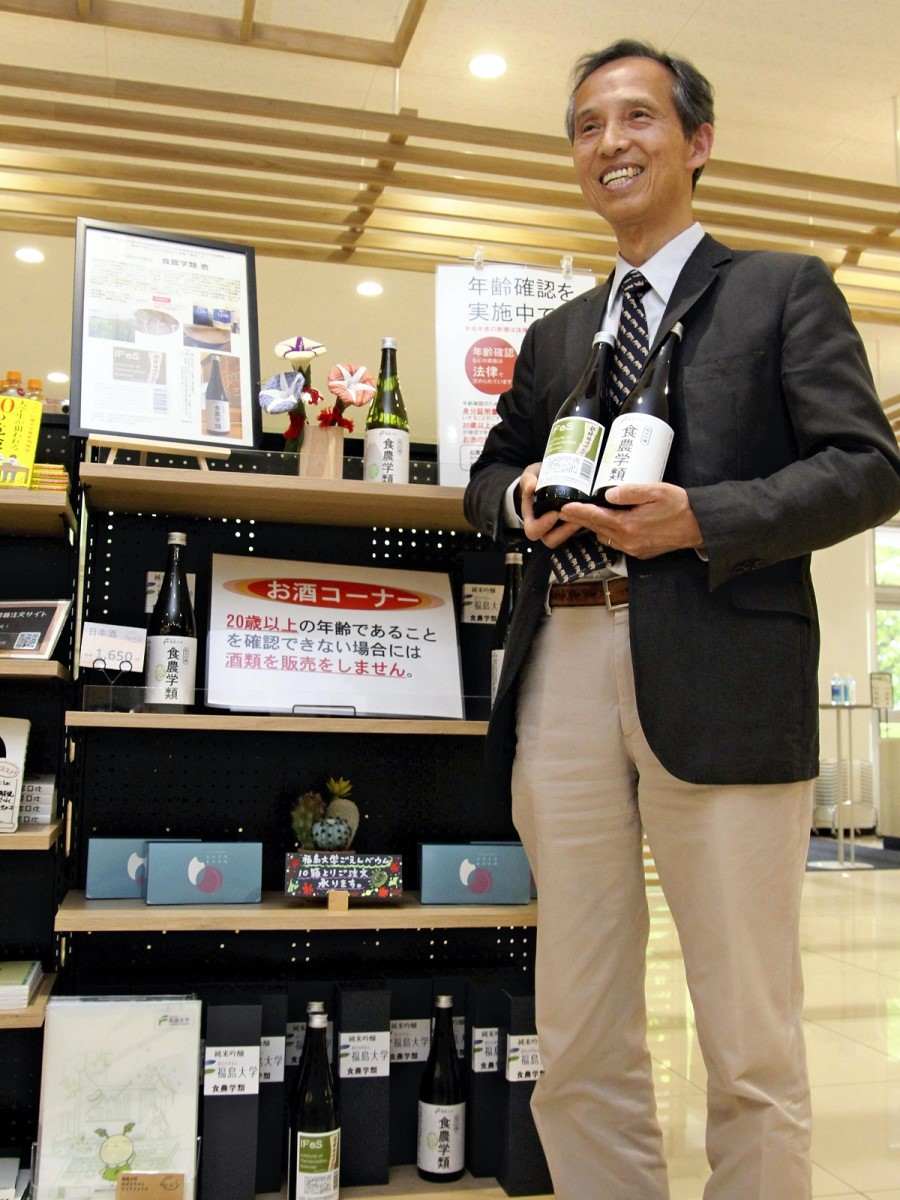
Tsukasa Matsuda, director of the Institute of Fermentation Sciences (IFeS), holds bottles of sake made from a new variety of sake rice, at Fukushima University in Fukushima in May.
6:00 JST, June 1, 2023
FUKUSHIMA — A joint public-private sector undertaking in Fukushima Prefecture — known for its sake-brewing — has developed a new rice variety cultivable in cold regions.
Those involved in the venture first selected early maturing variants of Yamada-Nishiki rice, a well-noted sake rice variety, to produce seed rice. They then test-brewed sake using rice harvested by the end of March. The team aims to continue improving the rice variety with the aim of popularizing it as a cold region-friendly sake rice.
Yamada-Nishiki, known as the “king of sake rice,” has characteristics such as a good waster-absorbing properties that make it particularly suitable for brewing sake. Sake made from the rice is said to have a delicate flavor.
Yamada-Nishiki is produced across Japan, but it most suited to warm-region cultivation. In 2020, a research team at Fukushima University in Fukushima started to develop sake rice with early maturing characteristics that can be harvested before the weather becomes cold. Starting with 4,000 early maturing Yamada-Nishiki rice plants, they singled out specimens that grew well in a test cultivation. The Institute of Fermentation Sciences (IFeS) at the university, which was established in 2021, then produced seed rice from the selected plants.
Mirai Nogyo, a Fukushima-based agricultural corporation, cooperated in the cultivation of the seed rice and harvested about 900 kilograms of rice from paddy fields spread across about 30 acres in September. The size and shape of the grain is almost identical to that of Yamada-Nishiki, according to the producers.
Suzuki Shuzo-ten, a sake brewery in Namie, in the prefecture, was asked to craft sake from the harvested rice and brewed about 900 bottles of junmai ginjo, a type of sake comprising only rice, water and koji, with a rice-polishing ratio of less than 60%.
IFeS Director Tsukasa Matsuda said, “The sake has a muscat-like aroma and a sharper mouthfeel than sake made from Yamada-Nishiki.”
Sake rice-related research and development is ongoing in various parts of the country. While sake rice capable of growing in cold areas has already been produced in Fukushima Prefecture, the newest rice strain was crossed only with Yamada-Nishiki, giving rise to expectations that it will have many similar characteristics.
Fukushima Prefecture has scooped more gold prizes than any other prefecture at the Zenkoku Shinshu Kanpyokai (National new sake appraising and deliberating fair), triumphing for nine straight years, until last year. The IFeS plans to further improve the quality and production of the new rice variety.
“Fukushima Prefecture has a lot of long-established sake breweries,” Matsuda noted. “We’d like to promote easy-to-grow and delicious sake rice varieties to help expand the repertoire of locally brewed sake.”
Top Articles in Society
-

Producer Behind Pop Group XG Arrested for Cocaine Possession
-

Man Infected with Measles Reportedly Dined at Restaurant in Tokyo Station
-

Man Infected with Measles May Have Come in Contact with Many People in Tokyo, Went to Store, Restaurant Around When Symptoms Emerged
-

Woman with Measles Visited Hospital in Tokyo Multiple Times Before Being Diagnosed with Disease
-

Australian Woman Dies After Mishap on Ski Lift in Nagano Prefecture
JN ACCESS RANKING
-

Producer Behind Pop Group XG Arrested for Cocaine Possession
-

Japan PM Takaichi’s Cabinet Resigns en Masse
-

Man Infected with Measles Reportedly Dined at Restaurant in Tokyo Station
-

Israeli Ambassador to Japan Speaks about Japan’s Role in the Reconstruction of Gaza
-

Videos Plagiarized, Reposted with False Subtitles Claiming ‘Ryukyu Belongs to China’; Anti-China False Information Also Posted in Japan
























